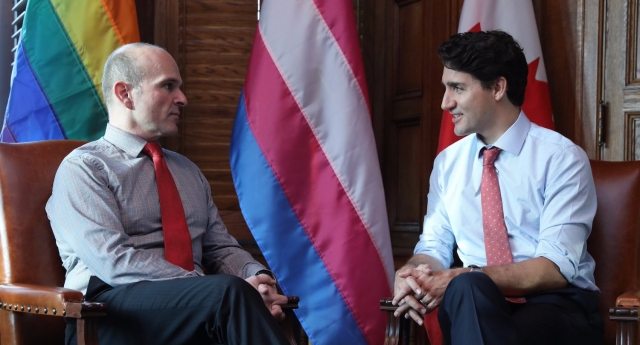Canada passes bill to clear criminal convictions from the records of gay men

Canadian PM Justin Trudeau (Getty)
The Canadian government has passed a bill that will allow men convicted under anal sex and gross indecency laws to have their convictions erased.
This follows Prime Minister Justin Trudeau’s apology to LGBTQ2 Canadians who had faced discrimination from previous governments.
Trudeau said last month: “We will be introducing legislation on this later this year, and further we will acknowledge and apologise for the historical discrimination faced by LGBTQ2 Canadians.
“We are committed to apologising in an inclusive and meaningful manner before the end of 2017.”
This ‘inclusive and meaningful manner’ includes the ‘Expungement of Historically Unjust Convictions Act’, also known as Bill C-66.

(Getty)
Canada’s law against anal intercourse if more than two people are present was only repealed in 2016, and the bill aims to remove the convictions that were made under this law.
Trudeau enshrined his commitment to anal sex equality last year, and showed his support for equalising the age of consent.
At present in Canada, the federal age of consent is 16 – but for anal intercourse outside of marriage, the age of consent is 18.
LGBT issues advisor to PM Trudeau and Liberal MP Randy Boissonnault greeted the news by saying: “Today, Canadians who were unjustly convicted because of who they loved are one step closer to clearing their names and moving on with their lives.”
Boissonnault highlighted the importance of the bill for those he called: “systematically discriminated against and demeaned.”
He said: “they spent much of their lives with all of the repercussions of a criminal record, unable in some cases to find work or even to travel with their families.”

Randy Boissonnault and Prime Minister Trudeau
Related: Canadian Prime Minister Justin Trudeau poses for cover of gay magazine Attitude
However, not everyone was happy with the bill.
The application process to have convictions removed will reportedly require applicants to prove consent of the other party, which may become a bureaucratic barrier.

Steven Maynard, a lecturer of the history of sexuality at Queen’s University also highlights that the three week period in which the bill was drafted, debated and passed, was not sufficient time for a bill of this importance.
He called the bill “limited and overly vague” and critiqued the bill in The Globe and Mail earlier this week.
Maynard said: “For the hundreds of men charged in police raids of bathhouses across the country from the 1970s on, Bill C-66 will be of no use.
“The same can be said for other Criminal Code provisions used to criminalize same-sex activity.”

He continued: “These include indecent acts (used against gay bars and men picked up in parks and other public places), obscenity (used in well-known cases against gay/lesbian bookstores such as Glad Day in Toronto and Little Sister’s in Vancouver) and vagrancy (used historically to arrest transgender people).”
“Because none of these offences are included in Bill C-66, anyone convicted under these laws will not be able to apply to have their records expunged.”
The bill still needs to be read and passed by the Canadian Senate before the bill becomes law and the process can begin for the gay Canadians affected by these laws.

